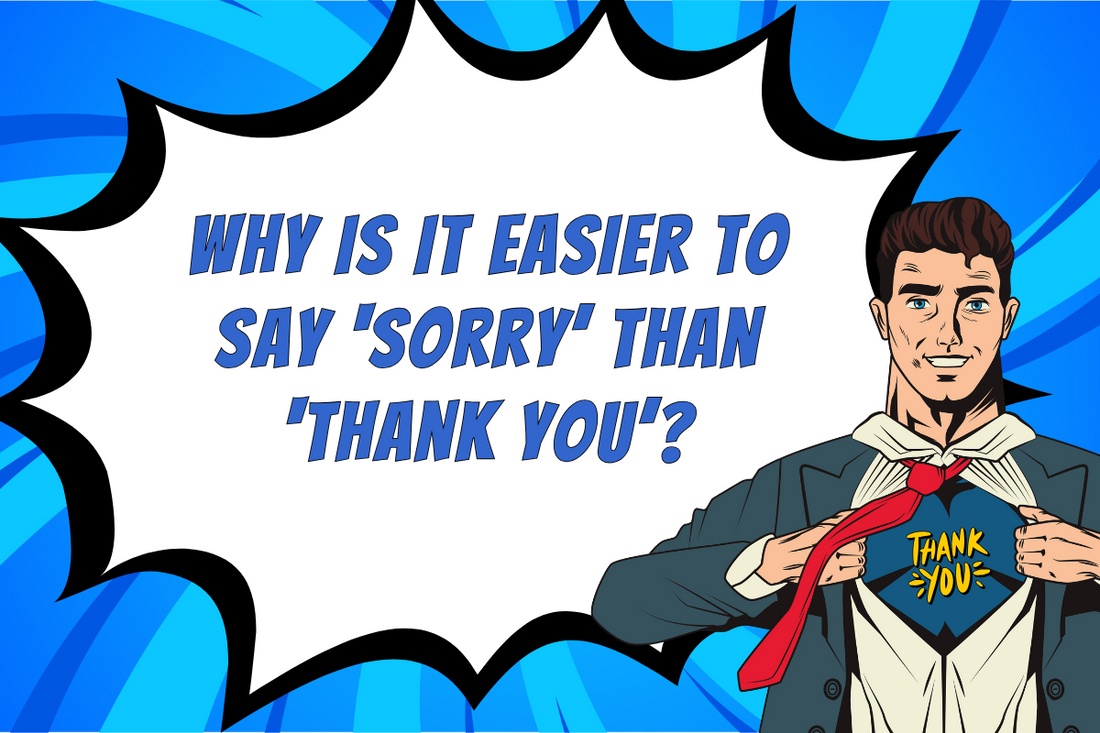
Why Is It Easier to Say ‘Sorry’ Than ‘Thank You’?
Share
Ever noticed how ‘sorry’ flies out of your mouth faster than a reflex, but ‘thank you’ feels like a formal speech?
Trip over thin air? Immediate "sorry" to the floor - because clearly, it had feelings.
Meanwhile, someone holds the door open for you, and you mumble “thhhanks” like you are held hostage.
Let’s break down why we are apology addicts and why gratitude somehow feels awkward.
The ‘Default Sorry’ Syndrome
Apologising has become our filler word, it is like saying ‘um’ in a presentation. We do not realise how often we do it. Consider these everyday moments:
- Sorry, can I ask a question? (No, you must communicate telepathically)
- Sorry, can I pass by? (I will just vaporise, no worries)
- Sorry, is it okay if I sit here? (No, the chair has been emotionally attached to someone else since 2012)
- Sorry, I exist! (okay, now it’s getting dramatic)
But why? Because apologising makes us seem polite. It softens whatever we are about to say. “Sorry, can I have a minute?” sounds way safer than “Hey, I need to talk.”
Fix: Replace ‘sorry’ with literally anything else.
- Try ‘Thanks for your patience’ instead of ‘Sorry I am late’.
- Or ‘Thank you for listening’ instead of ‘Sorry for dumping my emotions on you’.
‘Thank You’ feels…weirdly intimate?
For some reason, saying ‘thank you’ feels like you are revealing a deep, personal truth.
Friend: “Hey I love what you are wearing!”
You: “Oh, it’s just something I found in the trash. Haha. But thanks."
WHY do we reject compliments like we are being accused of a crime? Even worse, we overcompensate when saying thank you, turning it into an awkward gratitude monologue:
“Thank you sooo much!! Oh my god, I appreciate it, wow! That means a lot.I don’t deserve this!”
Fix: Say thank you and move on.
No deflecting. No “Haha noooo stop.” No “OMG it’s literally nothing.”
Just:
- Thanks, I appreciate it.
- Thanks, that means a lot.
- Thanks, I really like this outfit too.
Let it marinate. Let yourself own the compliment.
Apologising Feels Safer Than Owning Our Wins
Another reason we over apologise? Confidence makes us feel exposed.
- Sorry, I know this might not be perfect but…(how dare you acknowledge your effort?)
- Sorry if this is annoying, but I am very excited about…(Apologising for joy?)
Saying thank you means acknowledging your value - and that is terrifying. But guess what? You deserve to be recognised for what you do well.

Fix: Flip the script.
Instead of “Sorry, I talk too much”, say “Thanks for listening.”
Instead of “Sorry, I didn’t text you back sooner”, say “Thank you for understanding.”
Instead of “Sorry, this might sound like a stupid idea”, say “I have an idea I’d love to tell you.”
Confidence is not arrogance. And gratitude is not weird.
A Simple Challenge
Alright, let’s play a game. Count the number of times you say ‘sorry’ in a week.
You might think, Oh, I don’t over apologise that much. But these count:
- Sorry, can you repeat that?
- Sorry, can you pass the salt?
- Sorry, I’m a mess today!
Let’s be real: when you come to know the number of unwanted apologies you make, you will feel like that CAPTCHA test- popping up constantly even though you are clearly human.
3 Takeaways to Unlearn the ‘Sorry’ Reflex
- You are not an inconvenience. You are a whole main character - Stop apologising for being yourself. People can handle your presence without unnecessary apologies.
- Confidence is not a crime - Own your wins, take the compliment, and drop the self-sabotage. Saying thank you does not make you arrogant. It makes you self-aware.
- Save “Sorry” for when it matters - Apologies are meant to be meaningful. They are for the moments we genuinely mess up. When you apologise for things that do not need an apology, you are watering down the power of a real, heartfelt “I am sorry.”
Think about it: If someone keeps saying sorry over the smallest things, and they actually apologise when they truly need to make amends, it does not hit that hard.
Say sorry when you hurt someone.
Say sorry when you miss a commitment.
Say sorry when you make a mistake.
Remember: An apology carries weight. It is an act of accountability, not insecurity.
𝚂̶𝚘̶𝚛̶𝚛̶𝚢̶ ̶𝚒̶𝚏̶ ̶𝚝̶𝚑̶𝚒̶𝚜̶ ̶𝚠̶𝚊̶𝚜̶ ̶𝚝̶𝚘̶𝚘̶ ̶𝚖̶𝚞̶𝚌̶𝚑̶ ̶𝚊̶𝚍̶𝚟̶𝚒̶𝚌̶𝚎̶
Thank you for reading❤️
Keerthanaa,
Founder, kwurk
